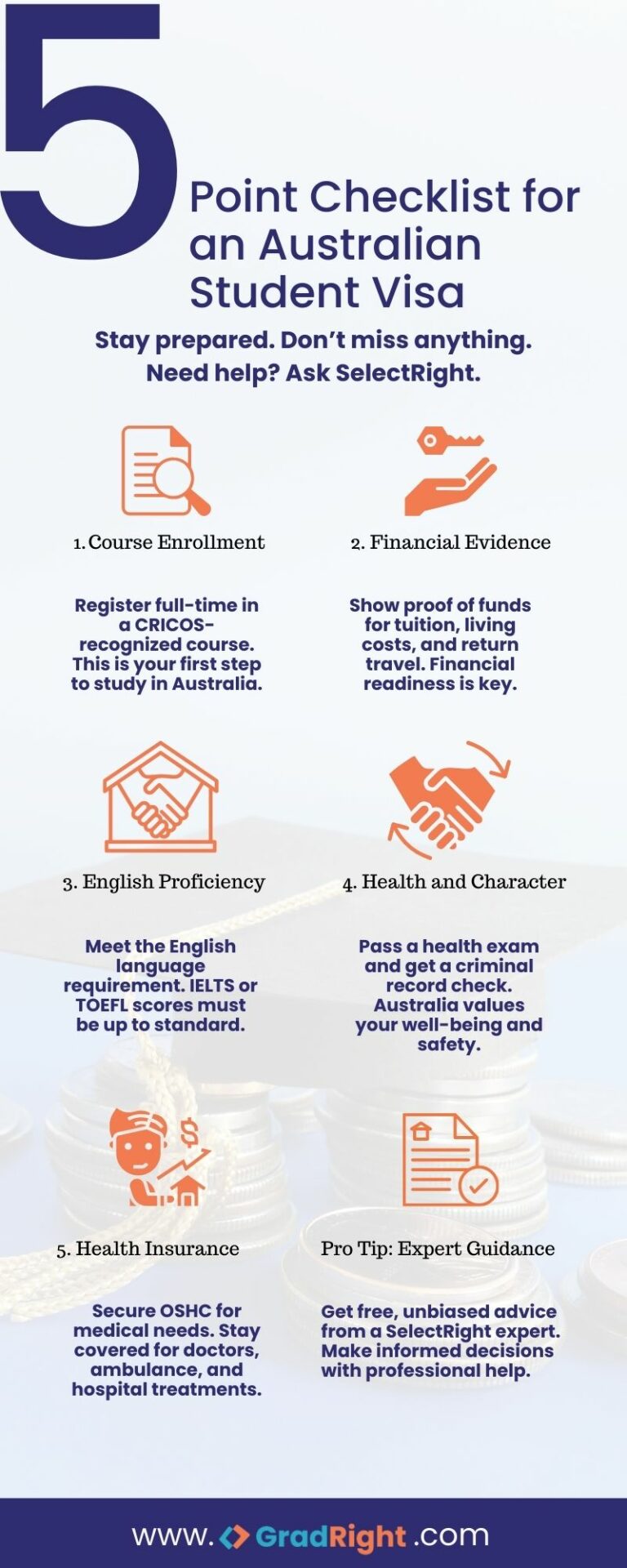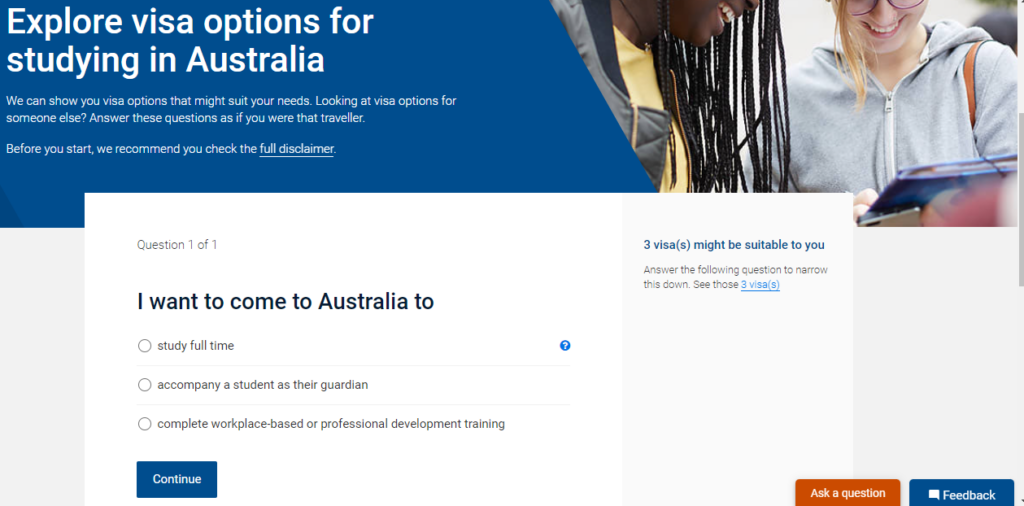All it takes is a few steps to apply for a student visa for Australia from India. And we’re here to take you through it. Australia is a sought-after study destination. With its famous universities, diverse cultures, and vibrant student life, it offers a great mix of everything – it’s no surprise why several students apply to this country. This guide will simplify how to get a student visa for Australia from India.
Australia student visa in 2025
Before you apply for your student visa for Australia from India, make note of these changes – especially if you’re sending in your visa applications after March 23, 2024.
As an overseas student, you will now need to score higher scores on English proficiency tests. For postgraduate courses, you need to get at least 6.5, and you’ll need a score of 6.0 for undergraduate courses.
Also Read: IELTS Band Requirement For Australia: Everything You Need To Know
There has also been a change in working hours for international students. As a student visa holder, you can work a maximum of 48 hours per fortnight.
To get a student visa to study in Australia, you also need to complete the “Genuine Student” test. This test will look into your intentions as a student. It will check if you are keen to study at Australian universities or if you merely want to work in the country.
The Temporary Graduate Visa has also gone through changes. Earlier, you could spend up to 8 years on a TGV, but now extensions are limited to those who studied regionally.
Student visa to study in Australia: eligibility criteria
To be eligible for a student visa for Australia from India, you must meet some other requirements:
- Enrol in a full-time course registered with the Commonwealth Register of Institutions and Courses for Overseas Students (CRICOS).
- Submit proof of sufficient funds. These funds must cover tuition fees, living expenses, and return airfare.
- Meet the proficiency requirements in the English language through standardised tests like IELTS or TOEFL.
- Get a health examination and a criminal record check done.
- Get an Overseas Student Health Cover (OSHC) for the duration of your stay – this will cover visits to the doctor (GP), ambulance, limited medicines, and some hospital treatments.

Australia student visa types
Since Australia attracts so many students worldwide, the government has made an effort to accommodate everyone with several types of student visas. Among these, the Subclass 500 (Student Visa), Subclass 485 (Temporary Graduate Visa), and Subclass 590 (Student Guardian Visa) are particularly noteworthy.
Subclass 500 (Student Visa)
- Valid for up to 5 years, the Subclass 500 visa is for those enrolled in an accredited full-time course in Australia.
- With this visa, you can apply to primary and secondary schools, vocational education and training (VET), higher education, and postgraduate research degrees.
Subclass 485 (Temporary Graduate Visa)
- This is for those who want to extend their stay in the country after graduating from an Australian institution.
- This visa has a Graduate Work stream (if you have completed a diploma or degree in Australia) and a Post-Study Work stream (if you have completed a bachelor’s degree or higher qualification).
Subclass 590 (Student Guardian Visa)
- The Subclass 590 visa applies to the guardians of students under 18 years of age (or older students with special needs) studying in Australia.
- With this, a parent, custodian, or relative can live with the student for the duration of their course or until the student turns 18. The guardians should be able to financially support themselves and the students during their stay.
- As the main goal of the guardian is to offer support to the student, they cannot work in Australia.
With these types of student visa to study in Australia, the country continues to be a leading destination for international education.
How to apply for a study visa in Australia?
First, ensure you have all required documents: a valid passport, English proficiency tests, letter of acceptance from an Australian University, proof of sufficient funds, application fee payment receipt, Overseas Student Health Cover (OSHC) receipt, all academic documents, and Statement of Purpose (SOP).
Next, apply for your student visa to study in Australia on the Australian Government’s Department of Home Affairs website, where you can pay the application fee.

Then, attend the interview and await the decision. Processing times can vary, so apply well in advance of your course start date.
Top universities to study in Australia
Australia is home to world-class universities. A few include:
University of Melbourne
Famous for its research facilities, it offers a wide range of undergraduate and postgraduate programs. Its campus is vibrant and located in the heart of Melbourne. Take a virtual tour now!
Australian National University (ANU)
Located in Canberra, ANU is known for its strong focus on science, policy, and the humanities and its excellence in education.
University of Sydney
Known for its stunning campus and course offerings, it is a leader in research, particularly in health sciences, and offers a vibrant campus life in Australia’s largest city.
To choose the best university and course for your needs, use SelectRight. With 40+ great universities to choose from in Australia, you need someone to do the number crunching for you.
Think of SelectRight as having Ramanujan by your side, to analyse all the data, and recommend the best universities for you.

Here’s how it works:
- Create your SelectRight account
- Complete your profile
- Let the AI engine process the data and map the right universities to your academic details and aspirations
- Compare universities and shortlist the suitable ones
- Get expert advice when you need it, from a SelectRight study abroad expert.
Education loans for Australia studies
You can’t plan your education abroad without considering your finances. Every year, thousands of students sign into education loans that aren’t exactly the best they could have found. FundRight ends this problem. Here’s how.
Here’s how it works:
- Register on FundRight (takes a couple of minutes)
- Specify your academic details and loan requirements
- Wait, and let India’s top 15 lenders offer you their most competitive interest rates
- Shortlist, compare, and then negotiate further, with the help of our expert financial advisors, who are on your side, throughout your journey
- Upload your documents securely and get your loan approved in as little as 10 working days.
Students have secured loans worth ₹2,000 crores via FundRight already. Some have saved as much as ₹23 lakhs. See how much you can save.
Frequently Asked Questions
1. How much are Australia visa fees for Indian students?
As of the last update, Australia visa fees for Indian students (Subclass 500 visa) are AUD620. But costs may vary depending on your location and if additional family members are included.
2. How long does it take to process an Australian student visa?
Processing times can vary depending on the time of year and the completeness of your application. Typically, it ranges from 29 days to 90 days.
3. What happens if my student visa for Australia from India is refused?
If your student visa to study in Australia is refused, you will receive a letter that explains the reason and if you have a right to review the decision.
4. How early can I apply for my Australian student visa?
You can apply for your student visa as soon as you receive your Confirmation of Enrolment (CoE). Try to apply at least 12 weeks before your course starts to allow enough time for processing.
What happens if I finish my course early?
If you complete your course earlier than the date specified on your visa, your visa might be cancelled, unless you begin another course, leave Australia, or apply for a different type of visa.

















